Vitiating Factors in Contract Law: An In-Depth Analysis
VerifiedAdded on 2020/05/11
|27
|4078
|141
Essay
AI Summary
The assignment focuses on understanding how vitiating factors such as misrepresentation, mistake, undue influence, duress, and unconscionability affect contract validity. Students will analyze these elements through theoretical frameworks and case law examples like Carlill v Carbolic Smoke Ball Co and Bissett v Wilkinson, among others. The objective is to evaluate the role of these factors in determining whether a contract can be voided or enforced. Additionally, the assignment discusses remedies available for contracts affected by such vitiating factors, including rescission and damages.
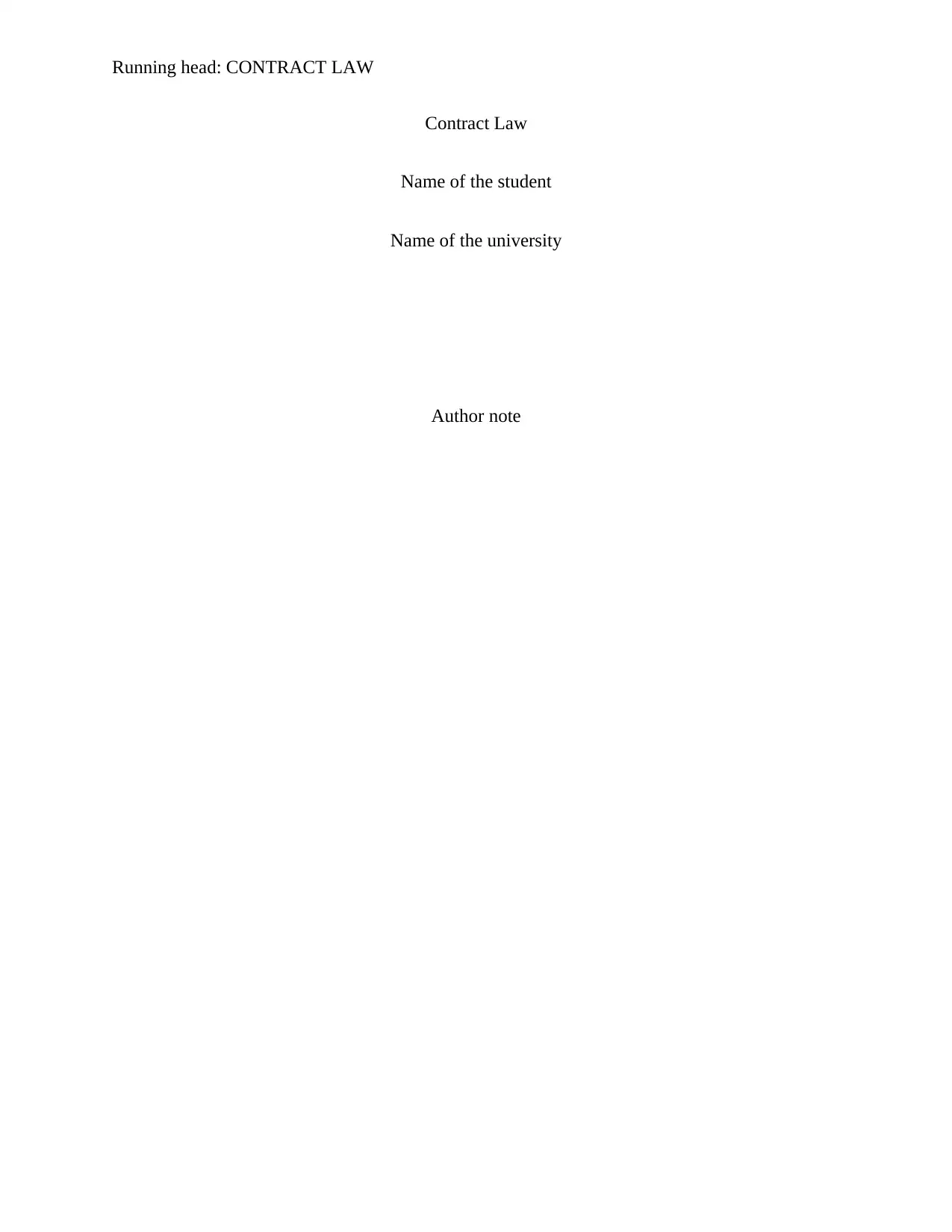
Running head: CONTRACT LAW
Contract Law
Name of the student
Name of the university
Author note
Contract Law
Name of the student
Name of the university
Author note
Paraphrase This Document
Need a fresh take? Get an instant paraphrase of this document with our AI Paraphraser
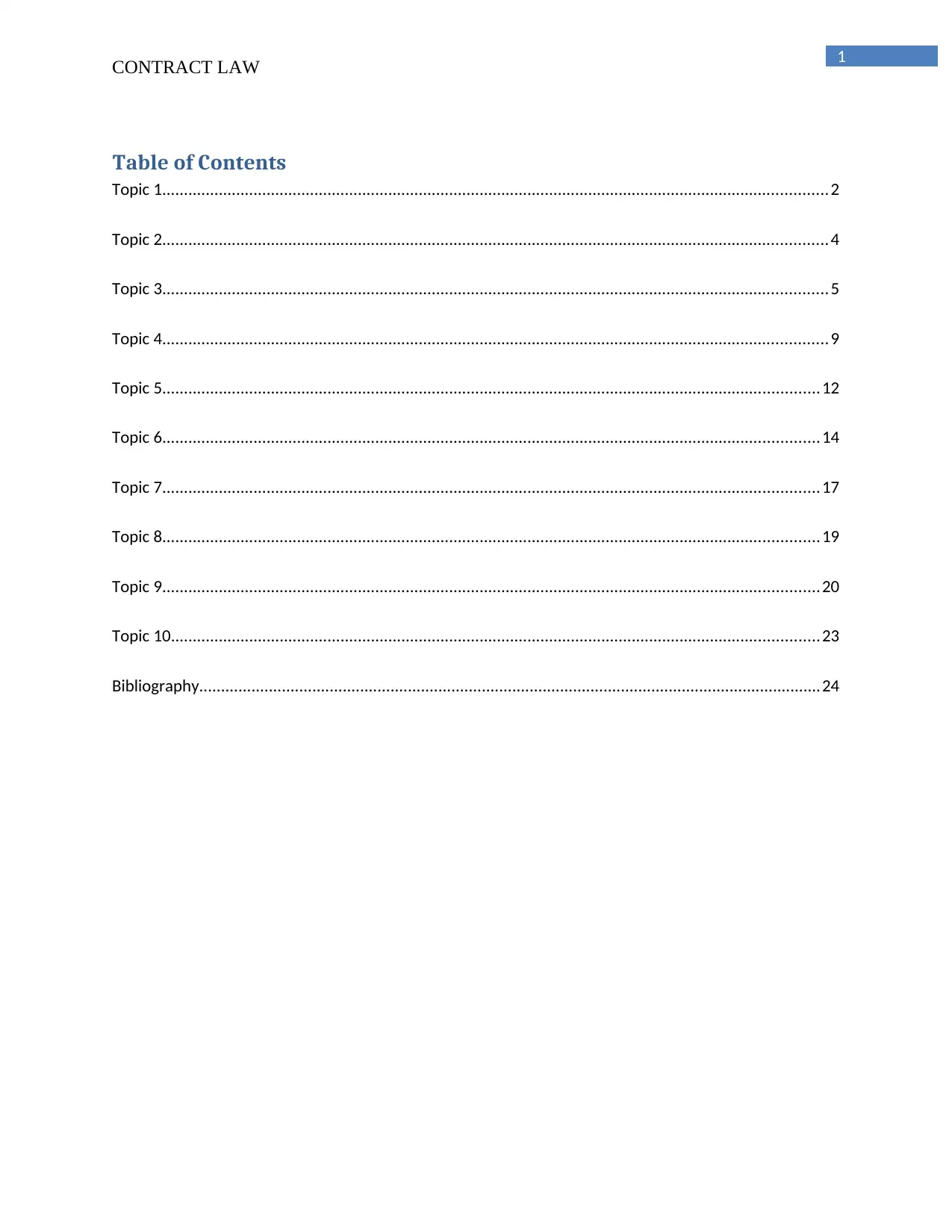
1
CONTRACT LAW
Table of Contents
Topic 1.........................................................................................................................................................2
Topic 2.........................................................................................................................................................4
Topic 3.........................................................................................................................................................5
Topic 4.........................................................................................................................................................9
Topic 5.......................................................................................................................................................12
Topic 6.......................................................................................................................................................14
Topic 7.......................................................................................................................................................17
Topic 8.......................................................................................................................................................19
Topic 9.......................................................................................................................................................20
Topic 10.....................................................................................................................................................23
Bibliography...............................................................................................................................................24
CONTRACT LAW
Table of Contents
Topic 1.........................................................................................................................................................2
Topic 2.........................................................................................................................................................4
Topic 3.........................................................................................................................................................5
Topic 4.........................................................................................................................................................9
Topic 5.......................................................................................................................................................12
Topic 6.......................................................................................................................................................14
Topic 7.......................................................................................................................................................17
Topic 8.......................................................................................................................................................19
Topic 9.......................................................................................................................................................20
Topic 10.....................................................................................................................................................23
Bibliography...............................................................................................................................................24
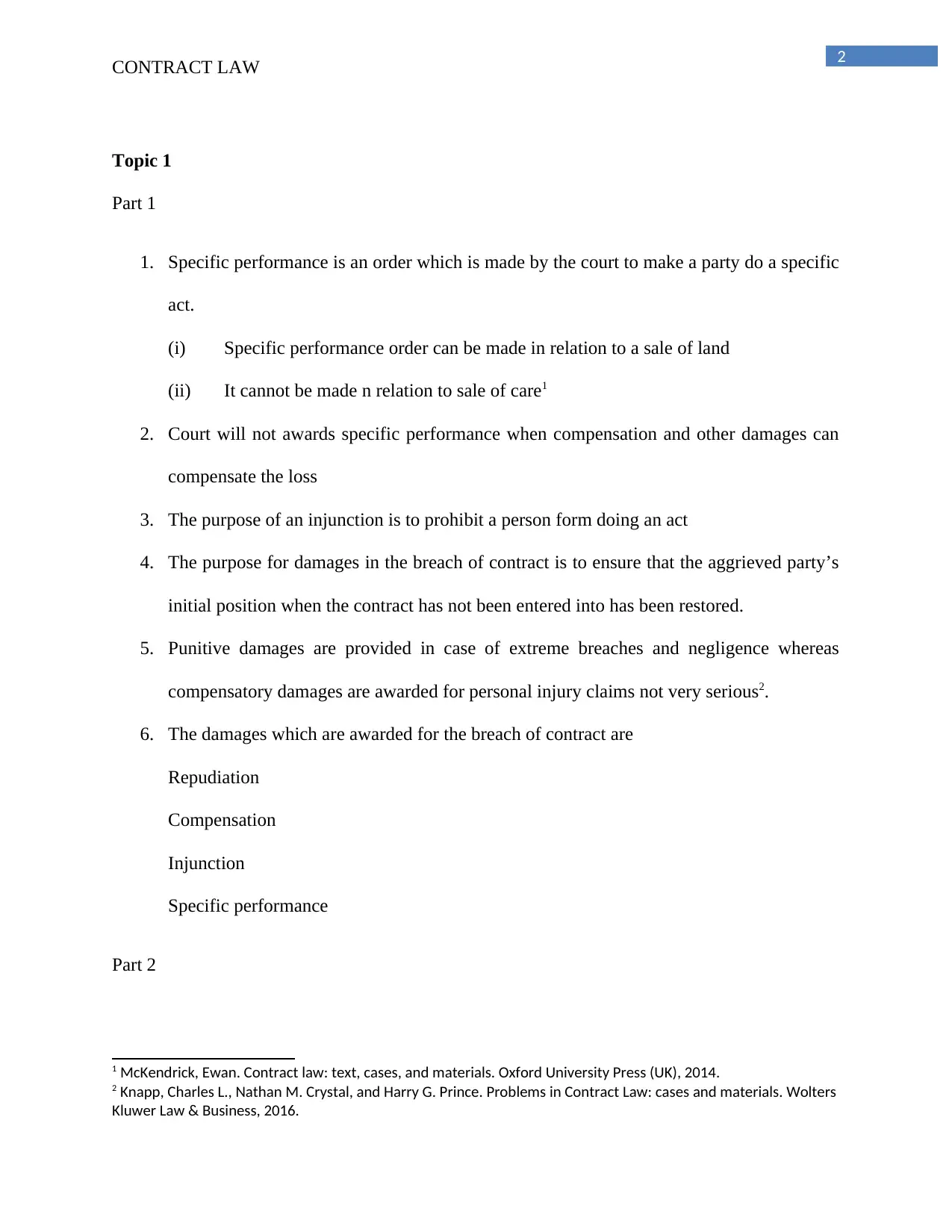
2
CONTRACT LAW
Topic 1
Part 1
1. Specific performance is an order which is made by the court to make a party do a specific
act.
(i) Specific performance order can be made in relation to a sale of land
(ii) It cannot be made n relation to sale of care1
2. Court will not awards specific performance when compensation and other damages can
compensate the loss
3. The purpose of an injunction is to prohibit a person form doing an act
4. The purpose for damages in the breach of contract is to ensure that the aggrieved party’s
initial position when the contract has not been entered into has been restored.
5. Punitive damages are provided in case of extreme breaches and negligence whereas
compensatory damages are awarded for personal injury claims not very serious2.
6. The damages which are awarded for the breach of contract are
Repudiation
Compensation
Injunction
Specific performance
Part 2
1 McKendrick, Ewan. Contract law: text, cases, and materials. Oxford University Press (UK), 2014.
2 Knapp, Charles L., Nathan M. Crystal, and Harry G. Prince. Problems in Contract Law: cases and materials. Wolters
Kluwer Law & Business, 2016.
CONTRACT LAW
Topic 1
Part 1
1. Specific performance is an order which is made by the court to make a party do a specific
act.
(i) Specific performance order can be made in relation to a sale of land
(ii) It cannot be made n relation to sale of care1
2. Court will not awards specific performance when compensation and other damages can
compensate the loss
3. The purpose of an injunction is to prohibit a person form doing an act
4. The purpose for damages in the breach of contract is to ensure that the aggrieved party’s
initial position when the contract has not been entered into has been restored.
5. Punitive damages are provided in case of extreme breaches and negligence whereas
compensatory damages are awarded for personal injury claims not very serious2.
6. The damages which are awarded for the breach of contract are
Repudiation
Compensation
Injunction
Specific performance
Part 2
1 McKendrick, Ewan. Contract law: text, cases, and materials. Oxford University Press (UK), 2014.
2 Knapp, Charles L., Nathan M. Crystal, and Harry G. Prince. Problems in Contract Law: cases and materials. Wolters
Kluwer Law & Business, 2016.
⊘ This is a preview!⊘
Do you want full access?
Subscribe today to unlock all pages.

Trusted by 1+ million students worldwide
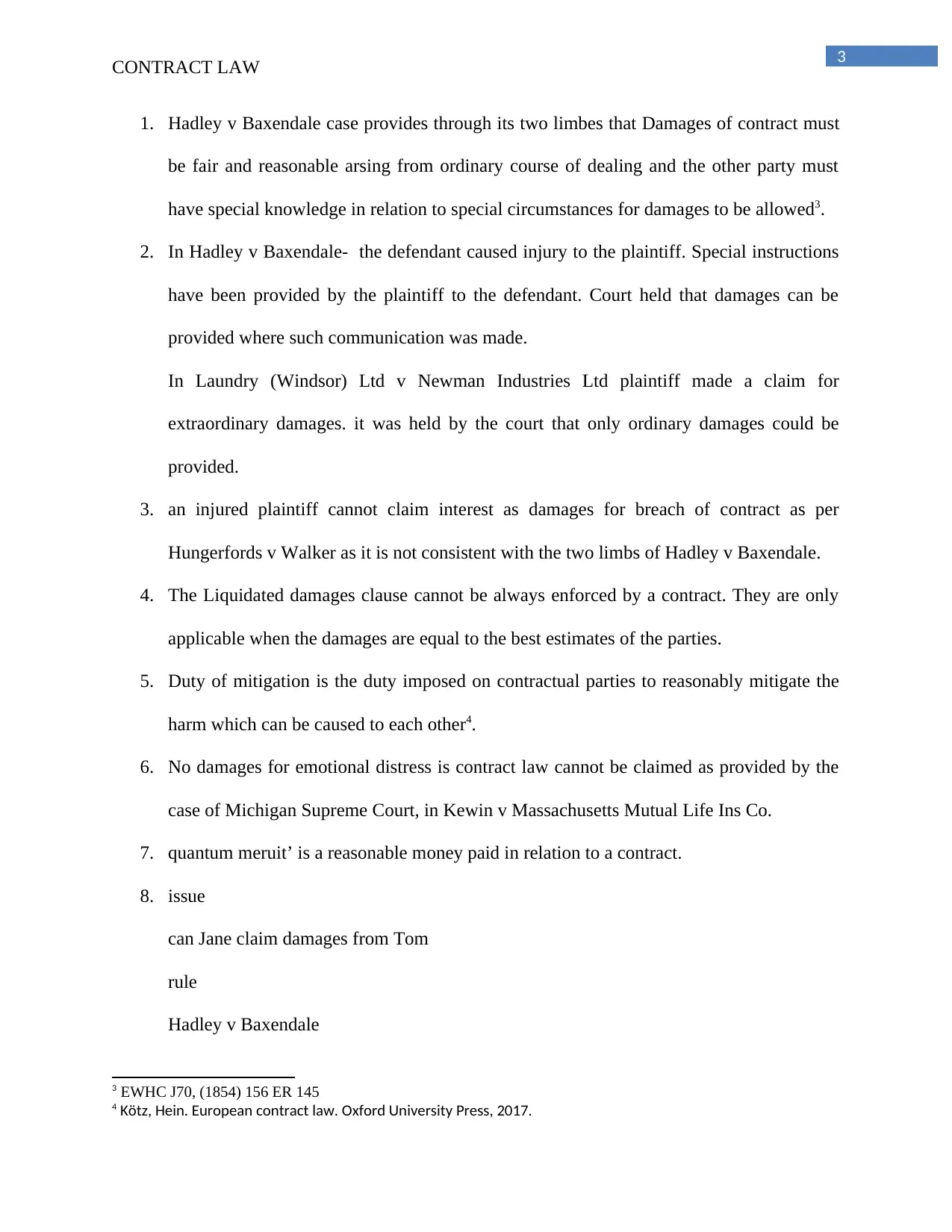
3
CONTRACT LAW
1. Hadley v Baxendale case provides through its two limbes that Damages of contract must
be fair and reasonable arsing from ordinary course of dealing and the other party must
have special knowledge in relation to special circumstances for damages to be allowed3.
2. In Hadley v Baxendale- the defendant caused injury to the plaintiff. Special instructions
have been provided by the plaintiff to the defendant. Court held that damages can be
provided where such communication was made.
In Laundry (Windsor) Ltd v Newman Industries Ltd plaintiff made a claim for
extraordinary damages. it was held by the court that only ordinary damages could be
provided.
3. an injured plaintiff cannot claim interest as damages for breach of contract as per
Hungerfords v Walker as it is not consistent with the two limbs of Hadley v Baxendale.
4. The Liquidated damages clause cannot be always enforced by a contract. They are only
applicable when the damages are equal to the best estimates of the parties.
5. Duty of mitigation is the duty imposed on contractual parties to reasonably mitigate the
harm which can be caused to each other4.
6. No damages for emotional distress is contract law cannot be claimed as provided by the
case of Michigan Supreme Court, in Kewin v Massachusetts Mutual Life Ins Co.
7. quantum meruit’ is a reasonable money paid in relation to a contract.
8. issue
can Jane claim damages from Tom
rule
Hadley v Baxendale
3 EWHC J70, (1854) 156 ER 145
4 Kötz, Hein. European contract law. Oxford University Press, 2017.
CONTRACT LAW
1. Hadley v Baxendale case provides through its two limbes that Damages of contract must
be fair and reasonable arsing from ordinary course of dealing and the other party must
have special knowledge in relation to special circumstances for damages to be allowed3.
2. In Hadley v Baxendale- the defendant caused injury to the plaintiff. Special instructions
have been provided by the plaintiff to the defendant. Court held that damages can be
provided where such communication was made.
In Laundry (Windsor) Ltd v Newman Industries Ltd plaintiff made a claim for
extraordinary damages. it was held by the court that only ordinary damages could be
provided.
3. an injured plaintiff cannot claim interest as damages for breach of contract as per
Hungerfords v Walker as it is not consistent with the two limbs of Hadley v Baxendale.
4. The Liquidated damages clause cannot be always enforced by a contract. They are only
applicable when the damages are equal to the best estimates of the parties.
5. Duty of mitigation is the duty imposed on contractual parties to reasonably mitigate the
harm which can be caused to each other4.
6. No damages for emotional distress is contract law cannot be claimed as provided by the
case of Michigan Supreme Court, in Kewin v Massachusetts Mutual Life Ins Co.
7. quantum meruit’ is a reasonable money paid in relation to a contract.
8. issue
can Jane claim damages from Tom
rule
Hadley v Baxendale
3 EWHC J70, (1854) 156 ER 145
4 Kötz, Hein. European contract law. Oxford University Press, 2017.
Paraphrase This Document
Need a fresh take? Get an instant paraphrase of this document with our AI Paraphraser

4
CONTRACT LAW
Application
All losses are reasonable
Conclusion
She can claim all losses.
Topic 2
Part 1
Question 1
The first idea is correct as complicated contracts have to be in writing. This is to avoid any
uncertainty in the future in relation to the terms of the contract. The second idea is not correct as
it is a simple contract and would cause inconvenience for both the parties and such dealings are
usually conducted by trade custom5s.
Part 2
Question 1
There is a contract as per Balfour v Balfour6 in case of the bank because there was an intention to
create a legal obligation. There is no contract as per Merritt v Merritt7 in relation to mum as the
intention of creating a legal obligation was not present in the case.
Question 2
Domestic arrangement – there was contract- no, the agreement was serious to be enforceable
5 Dressler, Joshua. "Problem in the Contract Law Bundle PAC." (2015).
6 [1919] 2 KB 571
7 [1970] EWCA Civ 6
CONTRACT LAW
Application
All losses are reasonable
Conclusion
She can claim all losses.
Topic 2
Part 1
Question 1
The first idea is correct as complicated contracts have to be in writing. This is to avoid any
uncertainty in the future in relation to the terms of the contract. The second idea is not correct as
it is a simple contract and would cause inconvenience for both the parties and such dealings are
usually conducted by trade custom5s.
Part 2
Question 1
There is a contract as per Balfour v Balfour6 in case of the bank because there was an intention to
create a legal obligation. There is no contract as per Merritt v Merritt7 in relation to mum as the
intention of creating a legal obligation was not present in the case.
Question 2
Domestic arrangement – there was contract- no, the agreement was serious to be enforceable
5 Dressler, Joshua. "Problem in the Contract Law Bundle PAC." (2015).
6 [1919] 2 KB 571
7 [1970] EWCA Civ 6
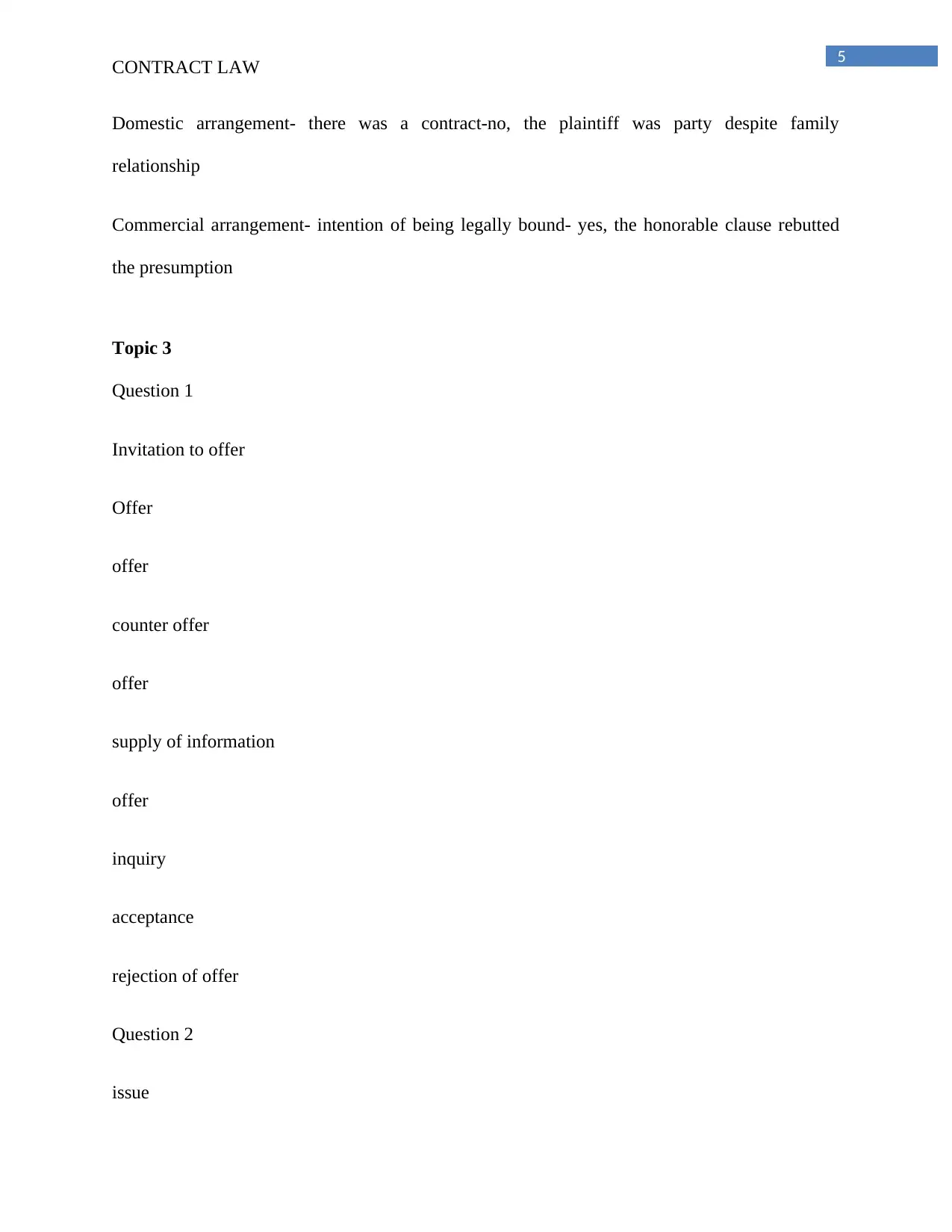
5
CONTRACT LAW
Domestic arrangement- there was a contract-no, the plaintiff was party despite family
relationship
Commercial arrangement- intention of being legally bound- yes, the honorable clause rebutted
the presumption
Topic 3
Question 1
Invitation to offer
Offer
offer
counter offer
offer
supply of information
offer
inquiry
acceptance
rejection of offer
Question 2
issue
CONTRACT LAW
Domestic arrangement- there was a contract-no, the plaintiff was party despite family
relationship
Commercial arrangement- intention of being legally bound- yes, the honorable clause rebutted
the presumption
Topic 3
Question 1
Invitation to offer
Offer
offer
counter offer
offer
supply of information
offer
inquiry
acceptance
rejection of offer
Question 2
issue
⊘ This is a preview!⊘
Do you want full access?
Subscribe today to unlock all pages.

Trusted by 1+ million students worldwide
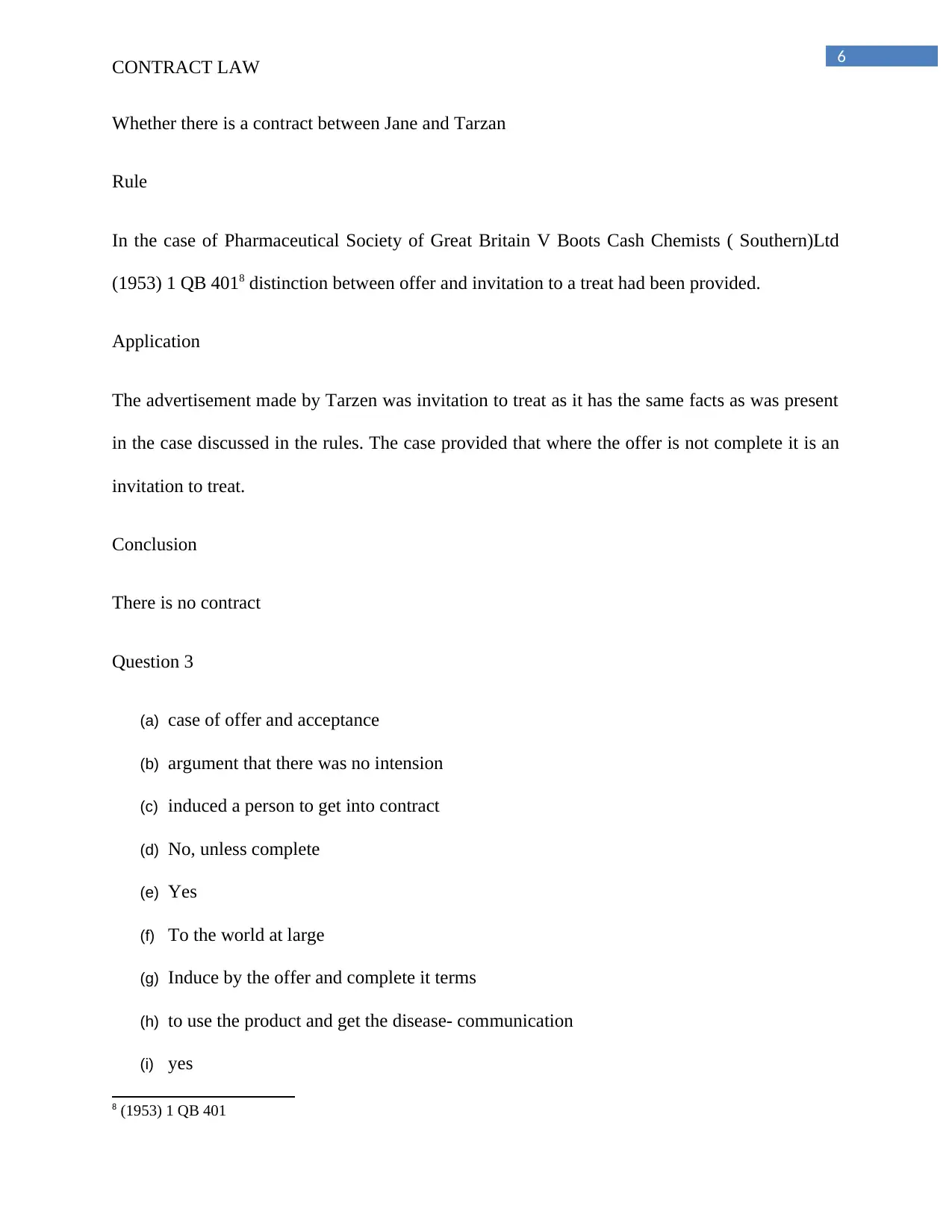
6
CONTRACT LAW
Whether there is a contract between Jane and Tarzan
Rule
In the case of Pharmaceutical Society of Great Britain V Boots Cash Chemists ( Southern)Ltd
(1953) 1 QB 4018 distinction between offer and invitation to a treat had been provided.
Application
The advertisement made by Tarzen was invitation to treat as it has the same facts as was present
in the case discussed in the rules. The case provided that where the offer is not complete it is an
invitation to treat.
Conclusion
There is no contract
Question 3
(a) case of offer and acceptance
(b) argument that there was no intension
(c) induced a person to get into contract
(d) No, unless complete
(e) Yes
(f) To the world at large
(g) Induce by the offer and complete it terms
(h) to use the product and get the disease- communication
(i) yes
8 (1953) 1 QB 401
CONTRACT LAW
Whether there is a contract between Jane and Tarzan
Rule
In the case of Pharmaceutical Society of Great Britain V Boots Cash Chemists ( Southern)Ltd
(1953) 1 QB 4018 distinction between offer and invitation to a treat had been provided.
Application
The advertisement made by Tarzen was invitation to treat as it has the same facts as was present
in the case discussed in the rules. The case provided that where the offer is not complete it is an
invitation to treat.
Conclusion
There is no contract
Question 3
(a) case of offer and acceptance
(b) argument that there was no intension
(c) induced a person to get into contract
(d) No, unless complete
(e) Yes
(f) To the world at large
(g) Induce by the offer and complete it terms
(h) to use the product and get the disease- communication
(i) yes
8 (1953) 1 QB 401
Paraphrase This Document
Need a fresh take? Get an instant paraphrase of this document with our AI Paraphraser
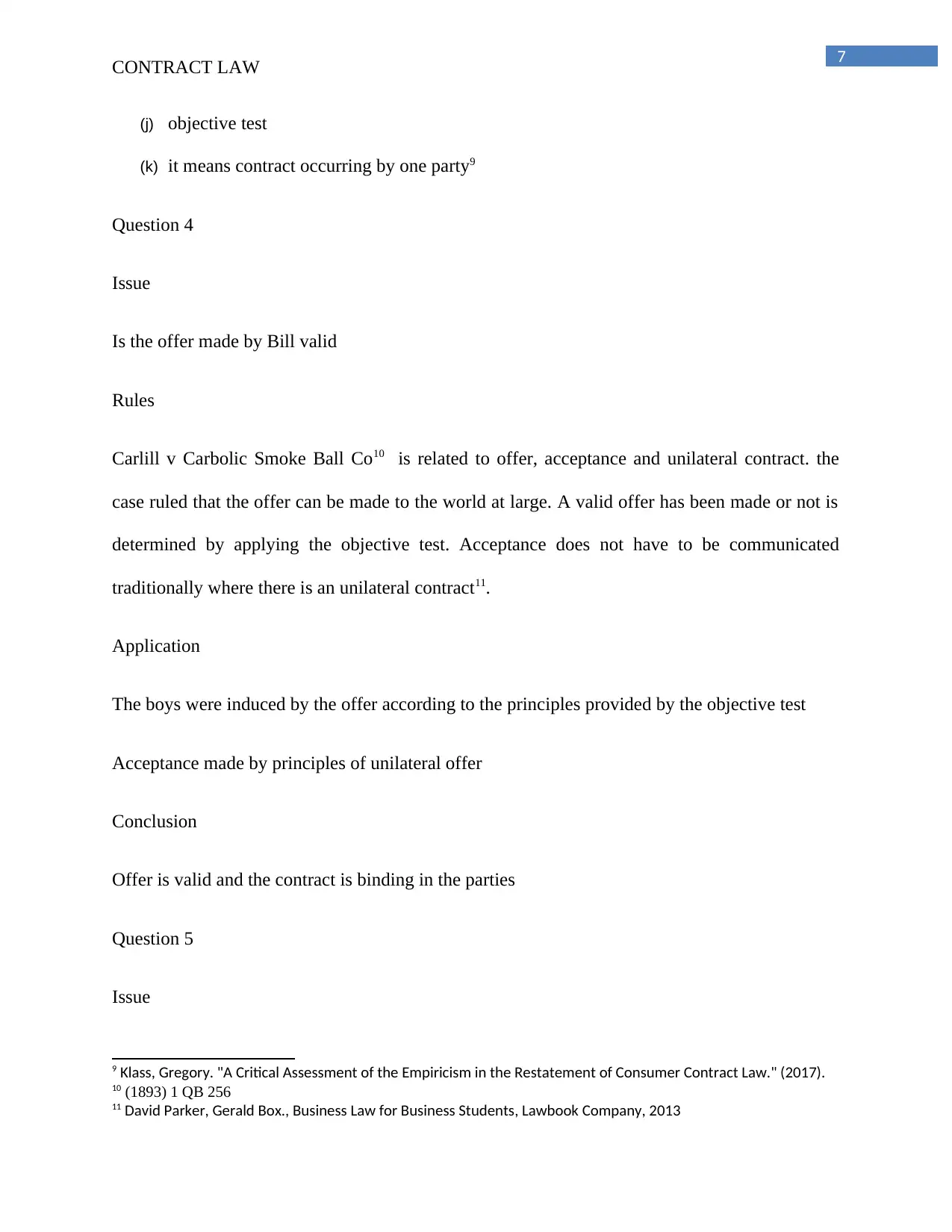
7
CONTRACT LAW
(j) objective test
(k) it means contract occurring by one party9
Question 4
Issue
Is the offer made by Bill valid
Rules
Carlill v Carbolic Smoke Ball Co10 is related to offer, acceptance and unilateral contract. the
case ruled that the offer can be made to the world at large. A valid offer has been made or not is
determined by applying the objective test. Acceptance does not have to be communicated
traditionally where there is an unilateral contract11.
Application
The boys were induced by the offer according to the principles provided by the objective test
Acceptance made by principles of unilateral offer
Conclusion
Offer is valid and the contract is binding in the parties
Question 5
Issue
9 Klass, Gregory. "A Critical Assessment of the Empiricism in the Restatement of Consumer Contract Law." (2017).
10 (1893) 1 QB 256
11 David Parker, Gerald Box., Business Law for Business Students, Lawbook Company, 2013
CONTRACT LAW
(j) objective test
(k) it means contract occurring by one party9
Question 4
Issue
Is the offer made by Bill valid
Rules
Carlill v Carbolic Smoke Ball Co10 is related to offer, acceptance and unilateral contract. the
case ruled that the offer can be made to the world at large. A valid offer has been made or not is
determined by applying the objective test. Acceptance does not have to be communicated
traditionally where there is an unilateral contract11.
Application
The boys were induced by the offer according to the principles provided by the objective test
Acceptance made by principles of unilateral offer
Conclusion
Offer is valid and the contract is binding in the parties
Question 5
Issue
9 Klass, Gregory. "A Critical Assessment of the Empiricism in the Restatement of Consumer Contract Law." (2017).
10 (1893) 1 QB 256
11 David Parker, Gerald Box., Business Law for Business Students, Lawbook Company, 2013
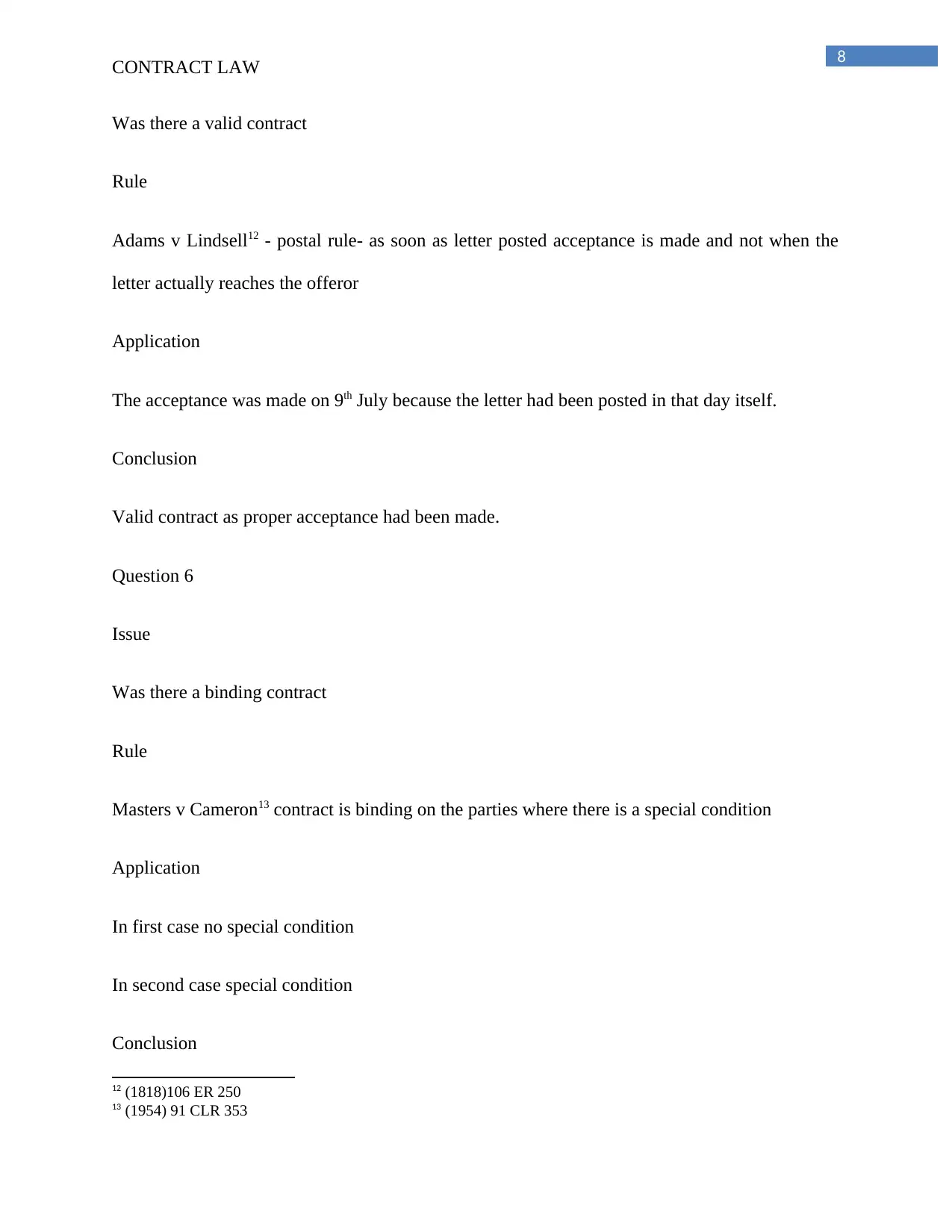
8
CONTRACT LAW
Was there a valid contract
Rule
Adams v Lindsell12 - postal rule- as soon as letter posted acceptance is made and not when the
letter actually reaches the offeror
Application
The acceptance was made on 9th July because the letter had been posted in that day itself.
Conclusion
Valid contract as proper acceptance had been made.
Question 6
Issue
Was there a binding contract
Rule
Masters v Cameron13 contract is binding on the parties where there is a special condition
Application
In first case no special condition
In second case special condition
Conclusion
12 (1818)106 ER 250
13 (1954) 91 CLR 353
CONTRACT LAW
Was there a valid contract
Rule
Adams v Lindsell12 - postal rule- as soon as letter posted acceptance is made and not when the
letter actually reaches the offeror
Application
The acceptance was made on 9th July because the letter had been posted in that day itself.
Conclusion
Valid contract as proper acceptance had been made.
Question 6
Issue
Was there a binding contract
Rule
Masters v Cameron13 contract is binding on the parties where there is a special condition
Application
In first case no special condition
In second case special condition
Conclusion
12 (1818)106 ER 250
13 (1954) 91 CLR 353
⊘ This is a preview!⊘
Do you want full access?
Subscribe today to unlock all pages.

Trusted by 1+ million students worldwide
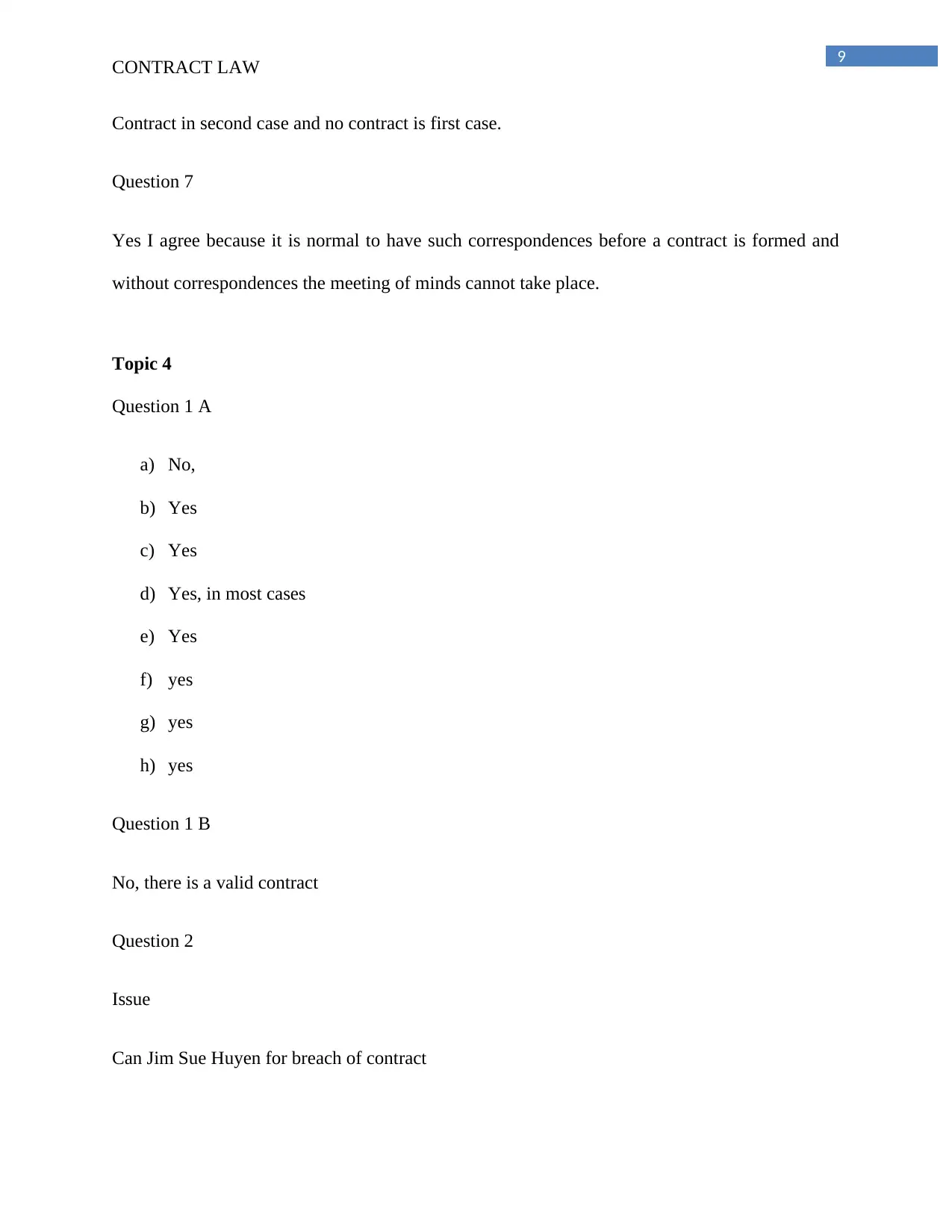
9
CONTRACT LAW
Contract in second case and no contract is first case.
Question 7
Yes I agree because it is normal to have such correspondences before a contract is formed and
without correspondences the meeting of minds cannot take place.
Topic 4
Question 1 A
a) No,
b) Yes
c) Yes
d) Yes, in most cases
e) Yes
f) yes
g) yes
h) yes
Question 1 B
No, there is a valid contract
Question 2
Issue
Can Jim Sue Huyen for breach of contract
CONTRACT LAW
Contract in second case and no contract is first case.
Question 7
Yes I agree because it is normal to have such correspondences before a contract is formed and
without correspondences the meeting of minds cannot take place.
Topic 4
Question 1 A
a) No,
b) Yes
c) Yes
d) Yes, in most cases
e) Yes
f) yes
g) yes
h) yes
Question 1 B
No, there is a valid contract
Question 2
Issue
Can Jim Sue Huyen for breach of contract
Paraphrase This Document
Need a fresh take? Get an instant paraphrase of this document with our AI Paraphraser
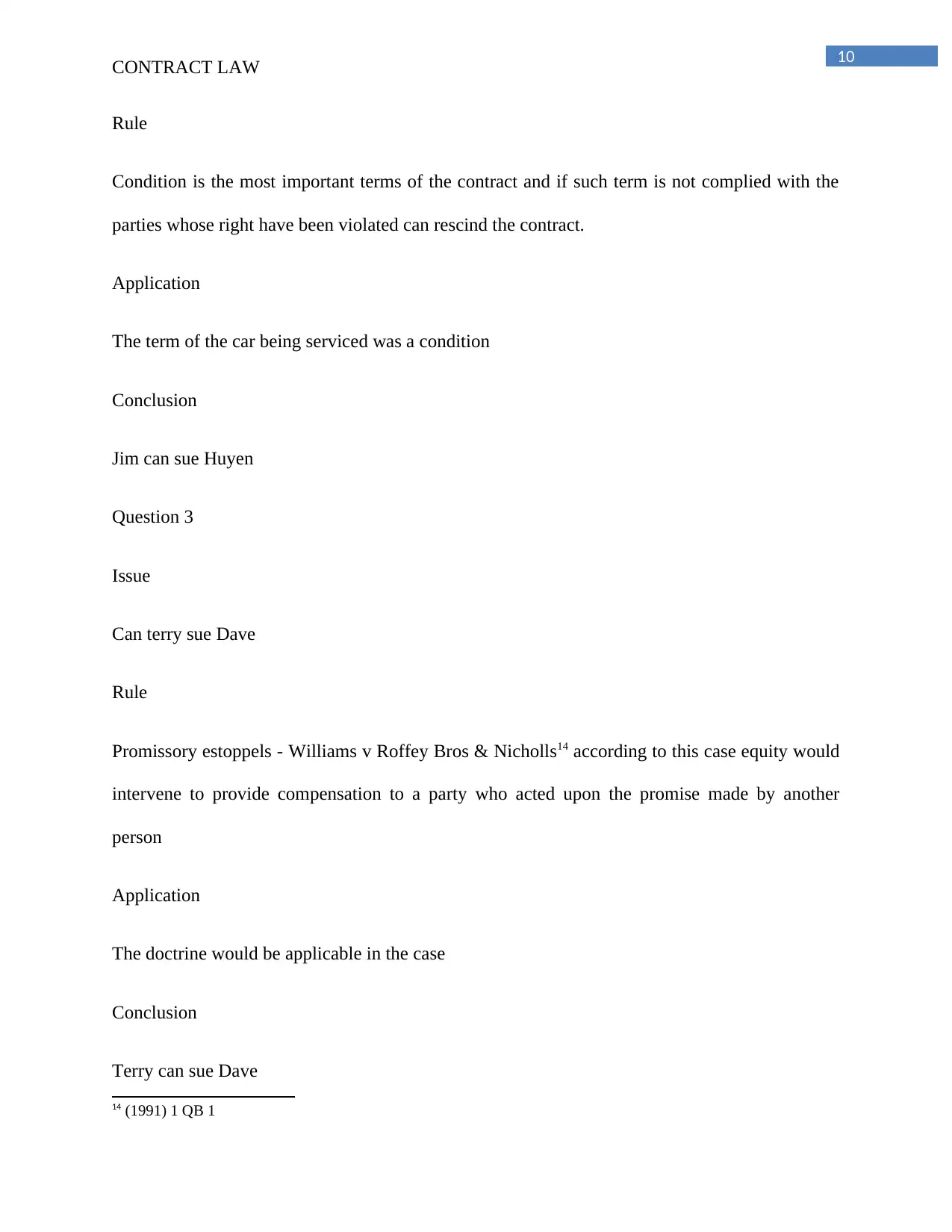
10
CONTRACT LAW
Rule
Condition is the most important terms of the contract and if such term is not complied with the
parties whose right have been violated can rescind the contract.
Application
The term of the car being serviced was a condition
Conclusion
Jim can sue Huyen
Question 3
Issue
Can terry sue Dave
Rule
Promissory estoppels - Williams v Roffey Bros & Nicholls14 according to this case equity would
intervene to provide compensation to a party who acted upon the promise made by another
person
Application
The doctrine would be applicable in the case
Conclusion
Terry can sue Dave
14 (1991) 1 QB 1
CONTRACT LAW
Rule
Condition is the most important terms of the contract and if such term is not complied with the
parties whose right have been violated can rescind the contract.
Application
The term of the car being serviced was a condition
Conclusion
Jim can sue Huyen
Question 3
Issue
Can terry sue Dave
Rule
Promissory estoppels - Williams v Roffey Bros & Nicholls14 according to this case equity would
intervene to provide compensation to a party who acted upon the promise made by another
person
Application
The doctrine would be applicable in the case
Conclusion
Terry can sue Dave
14 (1991) 1 QB 1
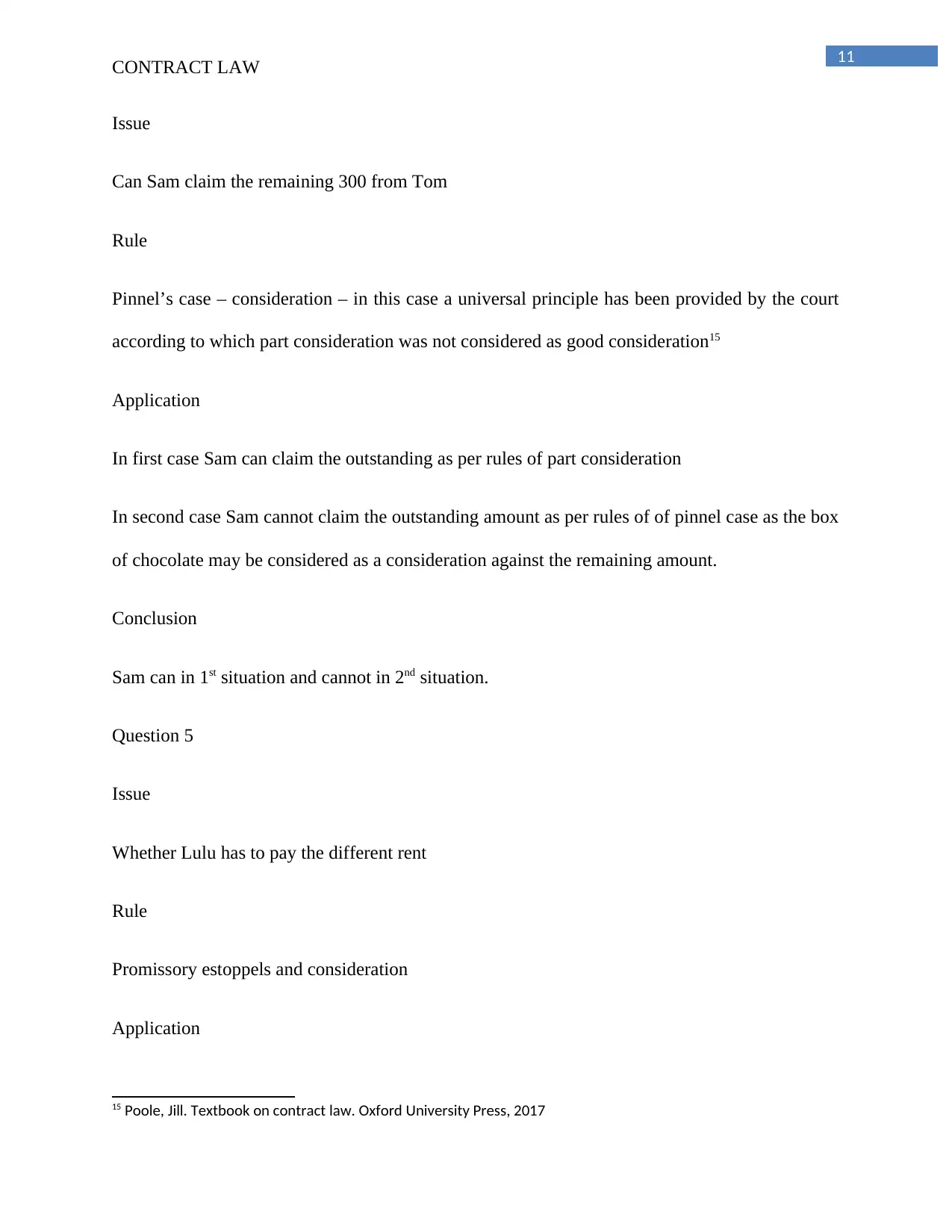
11
CONTRACT LAW
Issue
Can Sam claim the remaining 300 from Tom
Rule
Pinnel’s case – consideration – in this case a universal principle has been provided by the court
according to which part consideration was not considered as good consideration15
Application
In first case Sam can claim the outstanding as per rules of part consideration
In second case Sam cannot claim the outstanding amount as per rules of of pinnel case as the box
of chocolate may be considered as a consideration against the remaining amount.
Conclusion
Sam can in 1st situation and cannot in 2nd situation.
Question 5
Issue
Whether Lulu has to pay the different rent
Rule
Promissory estoppels and consideration
Application
15 Poole, Jill. Textbook on contract law. Oxford University Press, 2017
CONTRACT LAW
Issue
Can Sam claim the remaining 300 from Tom
Rule
Pinnel’s case – consideration – in this case a universal principle has been provided by the court
according to which part consideration was not considered as good consideration15
Application
In first case Sam can claim the outstanding as per rules of part consideration
In second case Sam cannot claim the outstanding amount as per rules of of pinnel case as the box
of chocolate may be considered as a consideration against the remaining amount.
Conclusion
Sam can in 1st situation and cannot in 2nd situation.
Question 5
Issue
Whether Lulu has to pay the different rent
Rule
Promissory estoppels and consideration
Application
15 Poole, Jill. Textbook on contract law. Oxford University Press, 2017
⊘ This is a preview!⊘
Do you want full access?
Subscribe today to unlock all pages.

Trusted by 1+ million students worldwide
1 out of 27
Related Documents
Your All-in-One AI-Powered Toolkit for Academic Success.
+13062052269
info@desklib.com
Available 24*7 on WhatsApp / Email
![[object Object]](/_next/static/media/star-bottom.7253800d.svg)
Unlock your academic potential
Copyright © 2020–2026 A2Z Services. All Rights Reserved. Developed and managed by ZUCOL.




